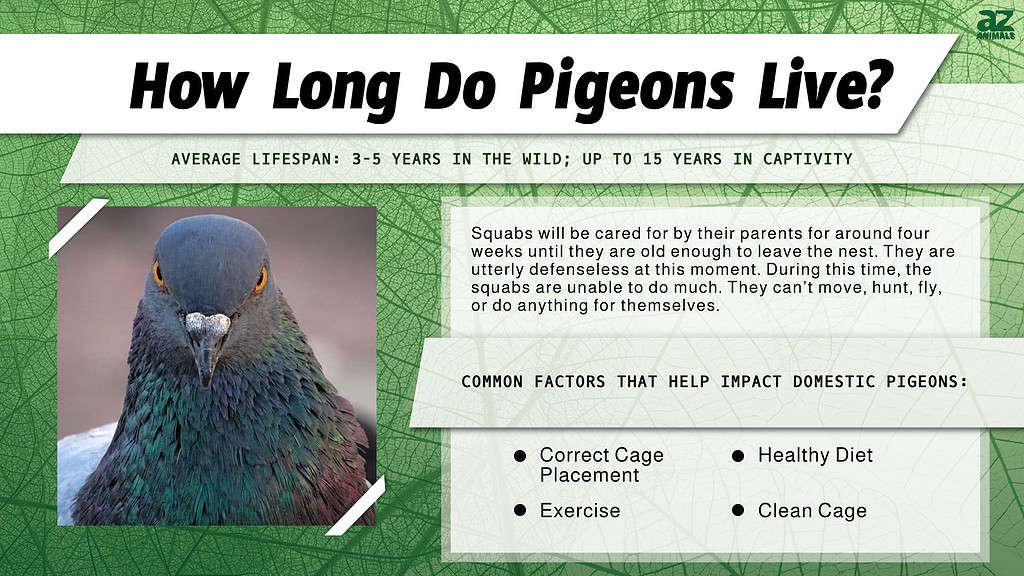
In our modern-day society, pigeons have gotten a pretty bad reputation. Often regarded as a ‘dirty’ bird that spreads disease, pigeons have been quite overlooked. However, in reality, these ideas are so far from the truth.
Pigeons are actually some of the most intelligent and social birds! In fact, they have been bred for centuries to be our domesticated companions. So if you’re curious to find out more and perhaps even wonder how long do pigeons live, then read on as we explore the pigeon lifespan.
A Quick Crash Course on Pigeons
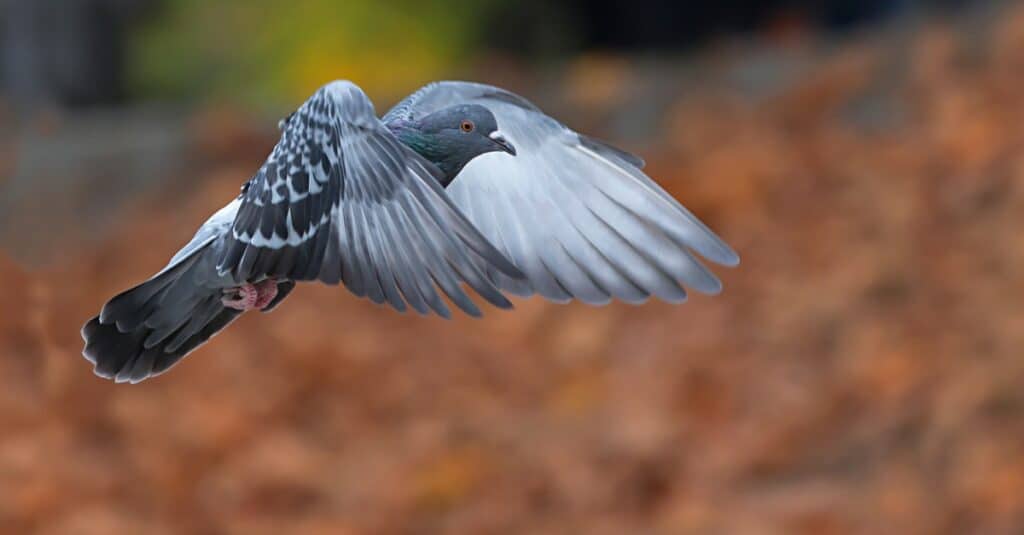
On average, pigeons live 3-5 years.
©N.Z.Photography/Shutterstock.com
The word ‘pigeon’ comes from the Latin word ‘pipio’, meaning ‘young peeping bird’. Pigeons are part of the Columbidae family along with doves. Wild pigeons can be found in coastal areas, whereas feral pigeons live near largely human-populated areas. They’re found in almost every habitat around the world except for the Sahara Desert, Antarctica, and the high Arctic.
What makes pigeons so fascinating is how intelligent they truly are. According to the Journal of Experimental Analysis of Behavior, pigeons are able to learn through a series of associations and create responses in their brain to the stimuli presented to them. This means that pigeons are able to recognize other pigeons and are capable of discrimination between different objects as well as making choices and telling time. When it comes down to animal intelligence, pigeons happen to top the charts.
What is the Average Lifespan of a Pigeon?
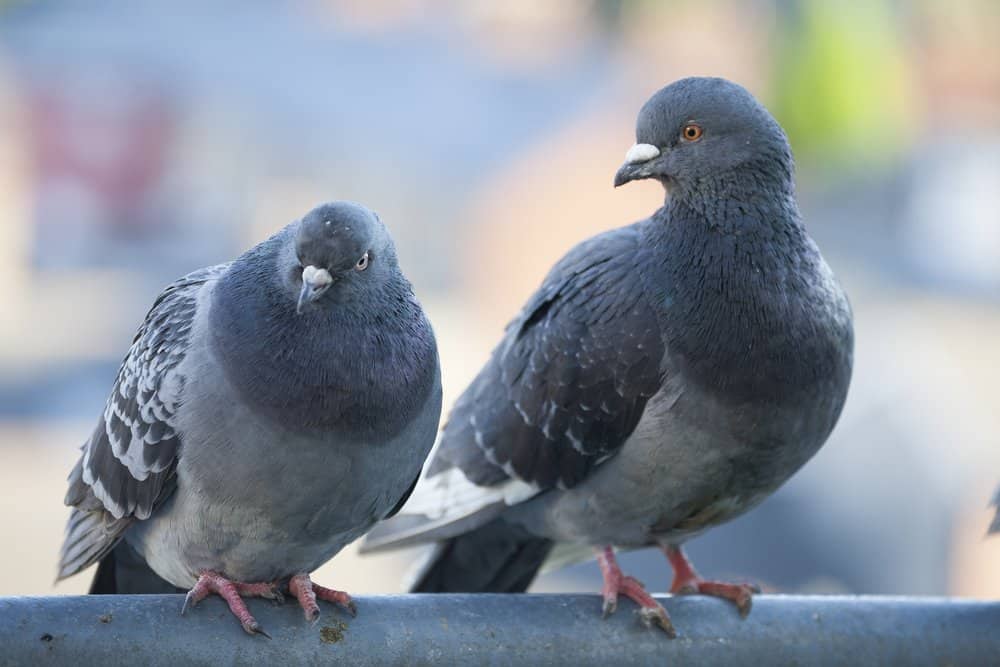
Pigeons can live up to 15 years when domesticated. The oldest pigeon on record reached 24 years old!
©Julie A Lynch/Shutterstock.com
On average, pigeons live 3-5 years in the wild. Domesticated pigeons have been known to live up to 15 years. The pigeon’s lifespan is dependent on several factors that include natural predators and interference from humans.
Pigeons are preyed upon by animals that include the peregrine falcon and at times, the sparrowhawk. Humans have also topped the list of natural predators as they have threatened the pigeons’ natural habitat.
The oldest living pigeon ever recorded was Peace, who lived to be an astonishing 147 years old in pigeon time. That’s 24 years and 188 days in pigeon time. Peace was taken in by Mrs. Whittingham, of Wellington Road when she came across the bird at a local rescue center.
The Pigeon Life Cycle Explained
Similar to many other birds, the pigeon life cycle starts with a few familiar stages. Let’s explore the natural progression of a pigeon’s life from the very start:
Egg
Like most other birds, pigeons begin their lives in an egg. The mother pigeon will sit on these eggs for around 18 days, incubating them. Due to the size of the kids, before they leave the nest, only two eggs are usually laid at a time.
Hatchlings
Once the eggs have been incubated, they will then begin to hatch. These newborn baby pigeons are known as squabs. Squabs will emerge from the egg with few or no feathers and with their eyes closed. Although they’re born with their eyes closed, this doesn’t last long. Their eyes will begin to open anywhere between a few hours and a day. After a few more days, fluffy feathers will also cover the young pigeons. These feathers, however, aren’t strong enough to let the pigeon fly yet. They will grow stronger feathers later on in the growth process.
Pigeon Squabs
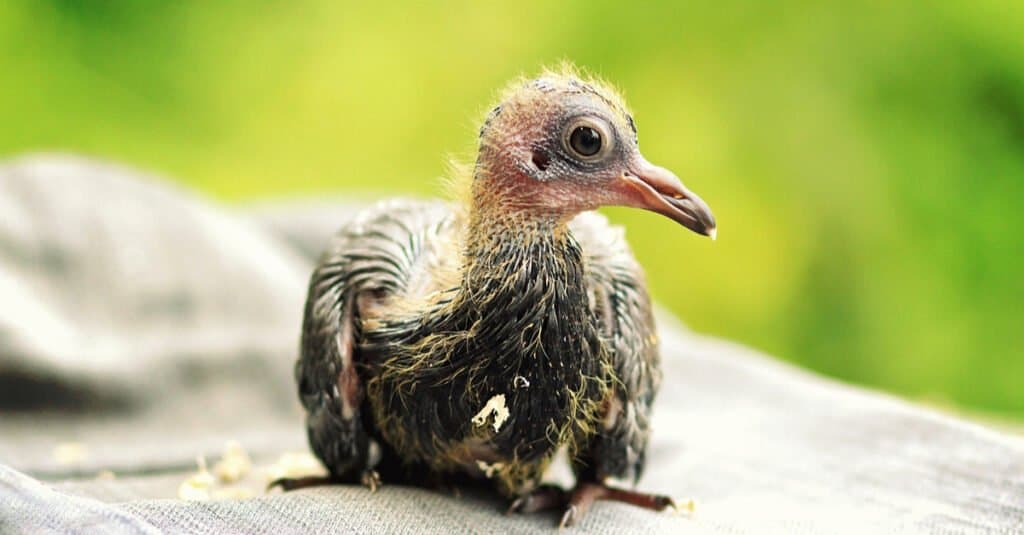
Squabs are fed on ‘crop milk’ by both parents.
©ARTFULLY PHOTOGRAPHER/Shutterstock.com
Squabs will be cared for by their parents for around four weeks until they are old enough to leave the nest. They are utterly defenseless at this moment. During this time, the squabs are unable to do much. They can’t move, hunt, fly, or do anything for themselves. This is also when the mother pigeons are the most protective of their nest. Once the squabs have finally developed their flight wings, they will begin to leave the nest.
Adult Pigeon
Adulthood begins when the pigeon has learned to properly fly. At this point, they will spend some time returning to the location of their original nest and staying in the local region. After 7 months or so, they will move on, find a partner, mate, and build their own nests to lay new eggs.
How to Extend the Life of a Pet Pigeon
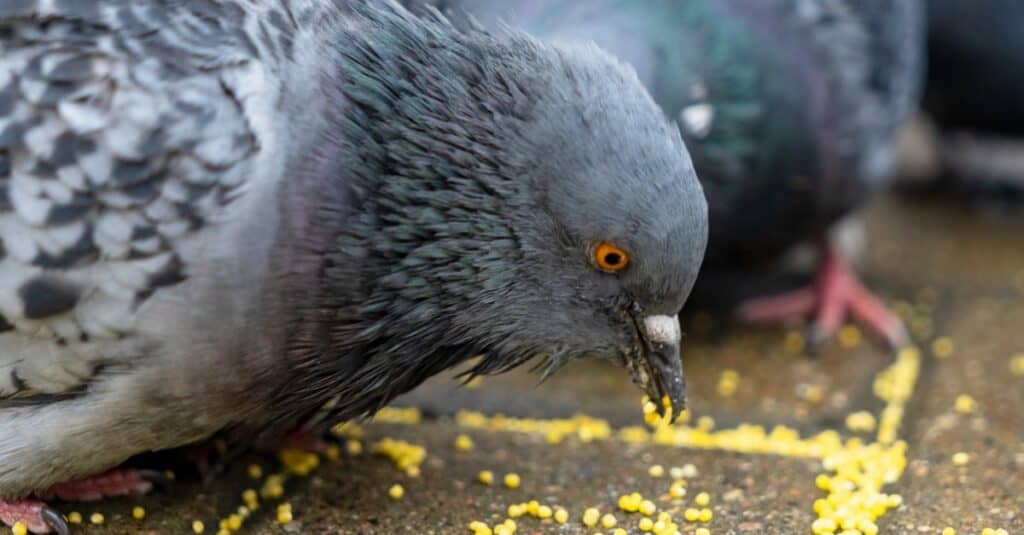
Seeds are the main part of a pigeon’s diet.
©iStock.com/Ivan Murauyou
Thanks to how smart, calm, and social pigeons are they’re been a popular pet option for many. They also do quite well in homes with other pets. Pigeons are also capable of expressing affection just as well as many other pets.
Since pet pigeons are able to live much longer than wild ones, it’s important to take proper care of them. If you’re hoping to extend the life of your pet pigeon, then keep these tips in mind:
- Cage care is essential to the life of your pigeon. Ensure that your bird’s cage is cleaned daily. Keep it out of drafty areas as well as away from direct sunlight. The size of the cage should be at least 2 feet high, 2 feet wide, and 2 feet long, although a bigger cage is always better.
- Feeding your pigeon the right diet is important for its health. The best option is to feed your pigeon a diet that consists of commercial bird feed and chopped fresh vegetables and fruits. This is the best way to ensure they get all of their vitamins and minerals.
- Exercise is also important. If you’re keeping your pigeon indoors inside of a cage, then you’re going to want to let them fly outside of the cage regularly.
The photo featured at the top of this post is © iStock.com/Christian Sturzenegger
Thank you for reading! Have some feedback for us? Contact the AZ Animals editorial team.






